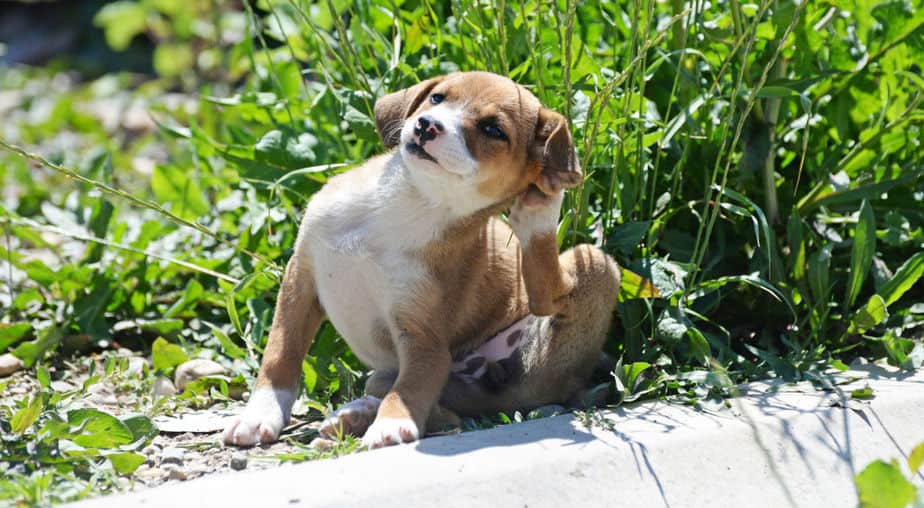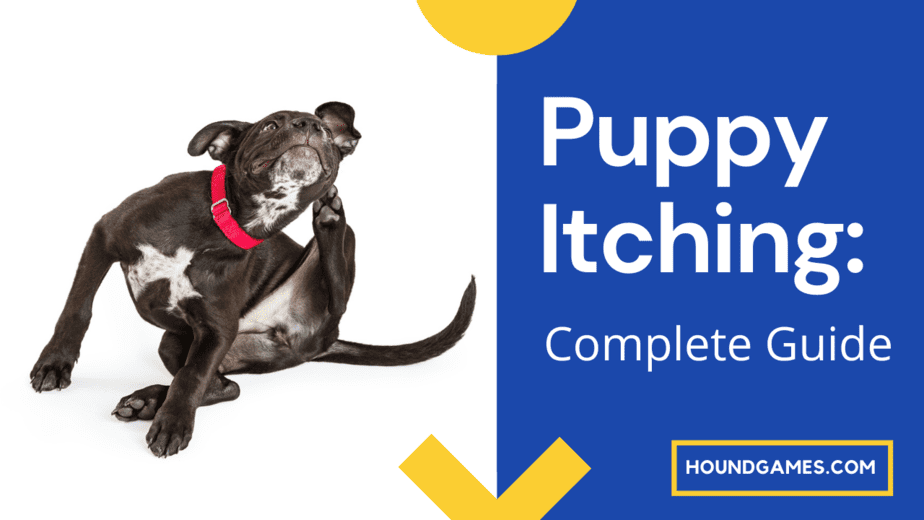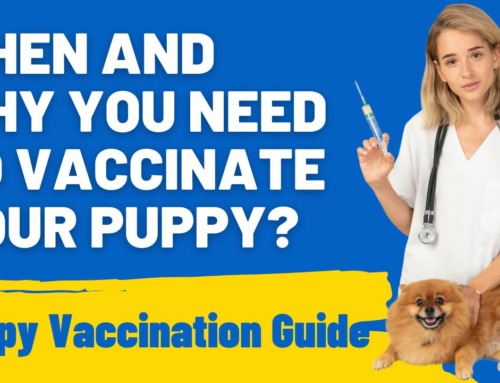A puppy enjoying a good belly scratch is one of the best bonding moments between a new pet parent and their dog. But what happens if your puppy seems to have chronically itching skin? Excessive scratching and itching in puppies is not something to be ignored. At best, it’s a source of discomfort; at worst, it could be a sign of something more serious.
So what to do about your puppy with itching skin, why do they do it, is it normal, and what are the remedies? Let’s help your itchy puppy!
Why is my puppy itching?
The cause of itchy skin or pruritis in puppies can be the result of many issues. These include:
- A common culprit is atopic dermatitis or environmental allergies, such as pollen, certain plants, and grasses, dust mites, or a food allergy. Keep in mind that food allergies only consist of about 10% of total dog allergies. Dogs are also mostly allergic to animal proteins like beef, chicken, or dairy products, and grain allergies are actually quite rare.
- The puppy is being bathed too frequently and losing the natural oils that keep their skin moisturized.
- Dogs with a dilute color in their coat, such as blues, fawns, cream, etc, can sometimes develop color dilution alopecia (CDA), resulting in hair loss and dry, flaky hair loss, and itchy skin.
- Nutritional deficiencies such as a lack of biotin, omega-6, and omega-3 fatty acids, or other nutrients essential for healthy skin or coat can cause itching in puppies.
- Disruptions in a puppy’s natural skin microbiome can cause a range of itchy skin problems. If some bacteria or fungus grows out of control, such as yeast infections between the toes or in the ears, hot spots, or mange, your puppy will itch.
- Parasites like ear mites, scabies, or fleas are two of the most common causes of itching.
- Dogs who are scratching chronically with no apparent cause may have developed pruritus due to stress.
- Sometimes itchy skin is the result of a severe underlying medical condition such as shunts, pediculosis.
If your puppy also is showing signs of dandruff, then be sure to read our post on puppy dandruff and dry skin here.

Is it normal for puppies to itch a lot?
No, it is not normal for puppies to itch and scratch their skin a lot. The occasional itch or a bit of scratching is perfectly normal, just like for us. However, suppose you see your puppy itching excessively. In that case, whether they are focused on one spot, like their paws, or trying to scratch their back by rubbing against something, there is usually an underlying cause.
How much itching is normal for a puppy depends upon a few factors, such as their coat. Are they shedding? Are they growing into their adult coat? Did you just wash them and they’re having a scratch after their bath?
Puppies do groom themselves and scratch occasionally, but if it’s excessive, you need to look for other indications that could be causing them skin irritation.
One of the most common causes of itching is fleas, and luckily, this is a problem you can solve yourself by simply combing through the hair.
Always make sure you double-check for flea dirt. Flea dirt is flea feces left by adult fleas. It usually is a dark red or black color and is the size of a grain of sand. However, there are usually clusters of flea dirt which makes it a bit easier to find.
The most common areas to check for fleas or flea dirt are the belly, neck, and groin. If you don’t see any fleas or traces of flea dirt, then the itching is being caused by other issues. It’s best to let your vet help you determine possible reasons for your excessive puppy’s itching by looking for allergies, discussing diet, and doing tests for unseen problems like mange or ear mites.
Puppy scratching can happen after vaccinations, although this is extremely rare. Normally, a puppy may be a bit tender at the site of the injection, and they may have some mild symptoms such as a low-grade fever, fatigue, appetite loss, and some nasal discharge.
If there are any more severe symptoms, your puppy will need to go to the vet immediately if they have an adverse reaction. Keep in mind; this is extremely rare.
Puppy itching but no fleas
Although itching from fleas is expected, a puppy itching without a flea infestation is probably more common. Once you have ruled out fleas, it will be a matter of eliminating other causes one by one.
A combination of tests and controlling your dog’s environment can help you rule out environmental allergies. The same process will be needed for food and food allergies, as you will need to rule out possible allergens one at a time.
Nutrition is often key to avoiding atopic dermatitis. One study suggests that puppies fed a properly balanced raw diet were 128% less likely to develop these kinds of allergies when adults.
Suppose your puppy has a mite or parasitic infestation, or an issue with the microbiome in your puppy’s skin. In that case, your vet will need to conduct tests.
Similarly, they will need to look for underlying problems such as shunts or a genetic problem such as CDA. If you notice your dog is itching in conjunction with hair loss, you can read our article Puppy has thin hair.
Puppy Itching: Collars
If your puppy is scratching excessively around the neck area, you may need to investigate the collar. A collar that is too tight may be causing irritation, discomfort, or chafing.
Likewise, it could be matting the coat underneath the collar. Matted hair can cause pulling on the hair strands, cause bacterial infection, inflamed skin, or other conditions that could cause your puppy to scratch.
If the collar is not too tight (you can comfortably fit two fingers between the collar and the neck) and there is no matting, you can try using collars made from different materials.
Your dog may be allergic to the collar itself, which is sometimes the case with certain metal collars. You could try the Fuzzy Friends Hypoallergenic Hemp Collar instead. Most flea collars are generally much less toxic these days and safer to use. Nevertheless, they can cause allergies too.
If you notice any redness or excessive scratching after putting on the collar, remove it and bathe your dog. It’s a good idea to keep a bottle of dermatopic shampoo nearby to relieve itchiness, or something like Honest Paws 5 in 1 for allergies.
After you have washed all the collar residue out, take your pup to the vet to discuss other tick and flea treatment options such Nexgard or Bravecto. You might need to read our post, My Dog Won’t Take Bravecto.
Puppy Itching: Ears
Several common issues can lead to a puppy having itching ears. Perhaps one of the most common is external otitis or an ear infection. Puppies with this condition may shake their head excessively or whine, as this condition can be extremely painful if left untreated. Signs of an ear infection include:
- Scratching at the ears
- Ears filled with a brown or red wax
- Redness in the ears, especially around the ear canal
- Smelly ears or discharge
- Rubbing head or face
- Head shaking
Ear infections are not just itchy and uncomfortable; they can really hurt. Treatment will need a medicated ear wash and prescription medications.
Making ear hygiene part of your regular routine care can help you avoid this problem in the future. However, ensure your vet or groomer shows you how to properly clean ears to avoid pushing wax or liquid down the ear canal.
Also, if you have a floppy ear dog breed, then they are more susceptible to ear problems, as their ear canals are warmer. This warm, moist environment is the ideal condition for mites or infections to develop.
Try and air them off for 30-minutes a day by gently tying them up with a hair tie, or when they are sleeping, flop an ear over to allow air to dry it out.
Another potential cause of puppy ear itching is ear mites. Ear mites are most common in puppies. The puppy will have nearly identical or very similar symptoms to an ear infection. They are highly contagious and can infect your other pets. Your vet will need to diagnose and treat the mites as soon as possible.
Finally, an overlooked issue in long-haired breeds is that matting occurs most often behind the ears, even if your puppy is quite well-groomed. Matted hair behind the ears can sometimes be enough of an irritation to cause some scratching.

Puppy Itching: Belly
Puppies who have itchy bellies are common, especially in light-skinned dogs. Itchiness specific to the belly usually comes in the form of rashes that occur around the groin or the exposed parts of the skin where the legs meet the rib-cage or inner thighs.
If you own a German Shorthaired Pointer, we have a post on dealing with dry and itchy skin in this breed here. This is usually because of contact dermatitis to skin irritants like lawn fertilizer, grass, or poison ivy.
It could also be the result of allergies, so you will need to undergo a process of elimination by limiting exposure to possible allergens and irritants one by one. Your vet can run allergen tests, but these aren’t always complete, and so you will need to do some investigation yourself.
Crusting of the skin or scabs may also cause itchiness. Scabs, red bumps, or pimples may all be caused by conditions such as puppy pyoderma or impetigo, a skin infection, as puppies have very sensitive skin.
It is also widespread in dogs with many skin folds, such as Shar Peis. Another issue may be folliculitis, where the hair follicles become inflamed with either a fungus or bacteria. Fleas or mites could also be the problem behind belly itching or rashes.
Puppy Itching Remedies
The big question is, what can you do to relieve puppy itching? Each scenario is different and should be treated accordingly. With that being said, here are a number of steps you can take.
Step 1. Treat parasites
If you notice your puppy has fleas, then you can start with an immediate bath with a tick and flea shampoo. Follow this with a treatment like Nexguard or Bravecto to keep parasites away long term.
After that, you will need to machine wash your pup’s bedding with the tick and flea shampoo and use a home flea treatment on furniture, carpets, and nooks and crannies where eggs and larva might still be.
Step 2. Look for medical problems
If the problem is not as apparent as fleas, you need to see your veterinarian so you can identify the cause. If the issue is something common, like puppy pyoderma, it may well go away on its own.
Suppose it is caused by a bacterium, fungal infection, or some sort of mite. In that case, your puppy will need mostly topical treatments and possibly some pills to take away.
If the problem is genetic, such as CDA, then it cannot be cured, but it can be managed with lifelong care. It would be best to encourage your vet to be thorough when investigating, as itching is a common symptom of underlying diseases like shunts that will need serious care.
Your vet can also direct you to the best shampoos to wash your dog with. Depending on the cause, you may need a special, medicated shampoo or a more widely available one for itch relief, such as Vet’s Best Spot Relief.
Step 3. Begin ruling out allergens and limiting exposure
If the cause seems to be an allergy, then you and your vet can work together to find the allergen. This is a lengthy process, as you will need to do tests and gradually remove exposure to certain things. Since the most common allergen is dust mites, you can start by removing them much as you would fleas, and using dehumidifiers, air purifiers, etc. to make your home inhospitable. Thereafter, you can check for exposure to grass, cedar, feathers and work your way down the list. The same process will apply to food allergies.
Step 4: Improve nutrition
Any kind of skin problem should always be addressed with good nutrition as well as medical care. Be sure your puppy is getting sufficient protein, omega-3 and omega-6 fatty acids, vitamin Bs, including biotin, vitamin E, and other nutrients, to maintain healthy skin. You can also consider moving them over to a raw diet, which some owners have had success with.

Puppy Itching After Bath
If your puppy is itching after a bath, you first want to check your shampoo and how often you are bathing your dog. Few dogs need to be bathed more than once a month, and doing so can strip their skin of natural oils, causing dry, flaky, and itchy skin that may even become inflamed.
The type of shampoo is just as critical. Never use human shampoos. Look for no-tear puppy shampoo made with simple ingredients such as oatmeal and aloe vera. Dog shampoos should not contain any artificial fragrances or dyes.
Final Thoughts
There are many causes behind puppy itching, the most common being allergies, fleas, or an infection. Although itching can sometimes be treated at home, as in the case of fleas, chronic itching will need input from your vet in case it is a symptom of a much larger problem.




